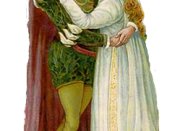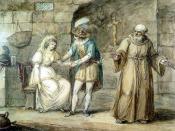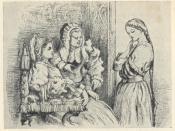Much can be learned about Shakespeare's Juliet from the text of the play. Capulet describes her as "yet a stranger in the world" (1.2.8) and she is not yet fourteen years old, as seen in "She hath not seen the change of fourteen years" (1.2.9). This implied naivete due to her age and situation is often focused on by players of Juliet. Holland also notes that "Juliet...as a young unmarried woman, is firmly kept indoors" (Holland. 38) and that she even needs permission to go to Friar Laurence for confession, as the nurse asks her "Have you got leave to go to shrift today?" (2.5.66).
However, further in the play, in becomes obvious that Juliet is strong-minded, has firm beliefs and is willing to act against the wishes of her father. Holland notes that though "Shakespeare's Juliet may be younger ...she has an intelligence and maturity Brooke and Painter did not allow for" (Holland.
43). Juliet holds firm beliefs that marriage should be for love, shown when her mother asks, "can you like of Paris' love" and Juliet replies, "I'll look to like, if looking liking move" (1.4.96-97).
Juliet is also much more realistic and practical than Romeo, particularly in Act 2 scene 2 where Juliet seems adamant that she has "no joy of this contract tonight./ It is too rash, too unadvised, too sudden" (2.2.117-118). She demands Romeo swear his love not by the "inconstant moon" (2.2.109) but "by thy gracious self" (2.2.112), thus taking more personal responsibility for what he is saying. Though it can be argued that Juliet is wary that Romeo may not be true in his love, she seems pragmatic enough to arrange for their marriage the next day, "If that they bent of love be honorable, / Thy purpose marriage, send me word tomorrow"...


